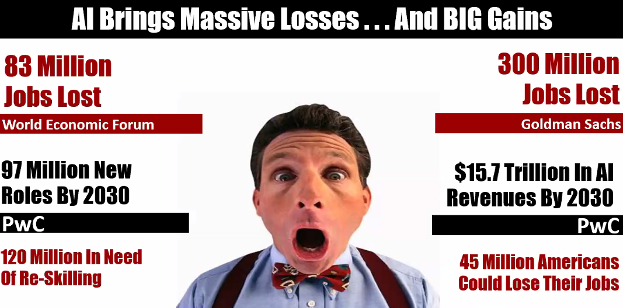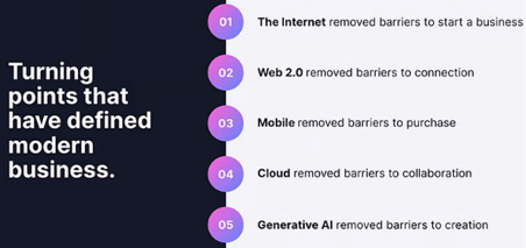Four Myths About AI and Content Marketing
Content marketers may feel like their entire world has changed in the past six months with the lightning adoption of ChatGPT and other groundbreaking artificial intelligence (AI) tools.
Indeed, it’s easy for content creators and marketers to feel overwhelmed by the dizzying pace of technological advances and what it all means for their careers and organizations. There are many questions that could take years to sort out around copyright, ethics, regulations, and other thorny issues. However, one thing is certain: AI is here to stay.
We believe that content marketing professionals in financial services who embrace AI as a productivity-boosting tool will be the winners. Sticking your head in the sand or being paralyzed with fear just aren’t acceptable options.
With so much hype and fear-inducing headlines about job losses and AI’s threat to humanity itself (cue The Terminator memes), taking a balanced and pragmatic view on AI is essential. This starts with debunking common myths around AI and content marketing.
Myth 1 – ChatGPT and AI are synonymous
Tools such as ChatGPT, which has the record for fastest to 100 million users, are certainly a type of AI. But AI is much more than generative AI chatbots.
“The best way to describe AI is that it’s like math because it has a lot of individual fields like arithmetic, algebra, trigonometry, and calculus,” said Christina “CK” Kerley in a recent AI webcast hosted by Rutgers Business School.
By now, most of us have at least experimented with chatbots or large language models (LLMs) such as ChatGPT and Google’s Bard. Generative AI is a similar technology that can create many different types of content, including text, images, and video. However, these two AI categories only scratch the surface.
Kerley, who coaches executives on how to adopt new technology, pointed out that other types of AI include:
- Machine learning
- Deep learning
- Virtual personal assistants
- Natural language processing
- Computer/machine vision
- Robotics
- Facial recognition
- Intelligent agents
Many of these technologies aren’t exactly new but it does feel like we’ve entered the hockey-stick phase of user adoption. That’s why many observers liken AI to the internet in the mid-1990s – in other words, it’s still early days.
“AI is going to change things and displace things, but it can also offer us a lot of growth,” Kerley added. “But we need to be open-minded and excited for this technology, which is really a tool. A lot of human history is a record of our tools, and AI is one of the most advanced tools we’ve ever seen.”
Myth 2 – AI will result in widespread job losses
We’ve all seen the headlines that millions of people will lose their jobs in coming years due to being replaced by AI. Certainly, estimates of AI-driven job losses in the coming decade range from 80 million to 300 million globally. However, there are also forecasts that AI could actually create nearly 100 million new roles and nearly $16 trillion of revenue by 2030.

Source: Christina “CK” Kerley
Financial brands and content marketing professionals need to be on the right side of the AI disruption. That means investment in AI training or at the very least setting aside a few hours a week to get proficient at using chatbots and generative AI. You don’t need to become a prompt engineer overnight, but knowing how to use ChatGPT and similar tools for research and ideation is already becoming table stakes for content creators.
Myth 3 – AI is coming for my marketing job
“Most of us are not going to have our jobs replaced by AI,” says Kerley. Instead, AI will replace a lot of the mundane tasks we do today as part of our jobs. Andrew Scarbrough, CEO of Delegator, in a recent webcast hosted by Agency Management Institute (AMI), said AI is currently being used for many tasks, including:
- Introduction and thank you emails
- Scheduling meetings
- Ideation for blogs and other content
- A/B testing
- Meeting notes
- Onboarding
- Systems training
Automating repetitive tasks actually lets workers spend more time on tasks that involve creativity and human interactions (as we’ll discuss in our fourth and final myth).
“Soft skills are going to have a renaissance,” Kerley said. “Brush up on those human skills like emotional intelligence, adaptability, and leadership.”
To put it bluntly: AI won’t take your job, but a human with good people skills who is better trained at using AI will.
Myth 4 – AI will make us less human and less creative
The future of work will be a lot different, but experienced professionals have already navitaged the advent of the internet and smartphones in their careers.
Kerley believes the key impact of generative AI is that it removes the barriers to creation, which obviously has large ramifications for the future of content marketing.

Source: Christina “CK” Kerley
She also believes that the AI revolution will make us more human, not less, because AI will take over the more “robotic” parts of our jobs that we don’t really like anyway.
“Finally, we can stop taking on the roles of the robots. Finally, our teams and our roles can stop being so tech heavy,” Kerley concluded. “We’ll still do a lot of technology, but our teams can become a lot more balanced.”
What does AI mean for financial content marketing?
This is a massively important question, and one we get asked frequently. We don’t have an answer for you—yet. We’re studying it from many angles and formulating our preliminary views. And we’ll share those views as they come into focus.
In the meantime, don’t hesitate to reach out if you have questions about what AI could mean for your team’s content marketing efforts.
 About the Author John Spence is Director, Marketing and Content Strategy, at Wentworth Financial Communications. He collaborates with a team of writers and editors at Wentworth to help firms across the financial services industry build their brands and articulate their expertise by creating investment-grade white papers, bylined articles, newsletters, blogs, social media posts, and other forms of content marketing.
About the Author John Spence is Director, Marketing and Content Strategy, at Wentworth Financial Communications. He collaborates with a team of writers and editors at Wentworth to help firms across the financial services industry build their brands and articulate their expertise by creating investment-grade white papers, bylined articles, newsletters, blogs, social media posts, and other forms of content marketing.
